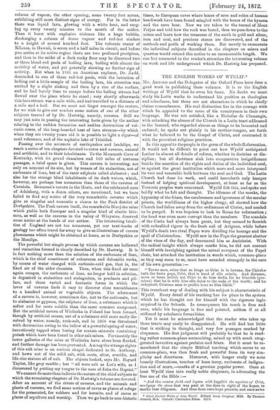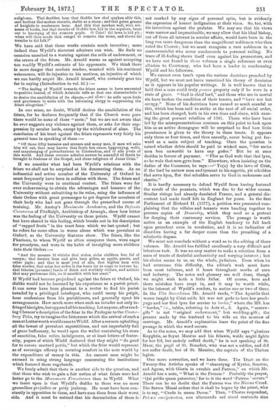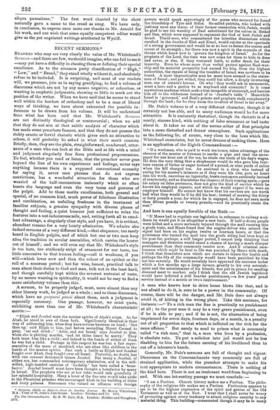THE ENGLISH WORKS OF WYCLIF.*
Mn. ARNOLD and the Delegates of the Oxford Press have done a good work in publishing these volumes. It is to the English
writings of Wyclif that he owes his fame. No doubt we must. study his Latin works to understand his position as theologian and schoolman, but these are not characters in which he chiefly claims remembrance. His real distinction lies in the courage with which he appealed to the mass of his countrymen in their owe language. He was not satisfied, like a Nicholas de Clemangis, with attacking the abuses of the Church in a Latin tract addressed to the learned, who regarded abuses as things to be lamented and
endured ; he spoke out plainly in his mother-tongue, set forth what he believed to be the Gospel of Christ, and contrasted it
with the prevalent religious practices.
In this appealto thepeople is the germ of thewhole Reformation.. It would not be difficult to point out how Wyclif anticipate& Luther in almost all details of reform, whether in doctrine or dis- cipline;but all doctrines sink into comparative insignificance beside the assertion of the rights and duties of the individual soul, as against the great institution which more and more interposed its vast and venerable bulk between the soul and God. The Latin Church had done its work, and could henceforth only hamper instead of helping spiritual development, at least as far as the Teutonic peoples were concerned. Wyclif felt this, and spoke out boldly what he felt and thought. The idleness of the monks, the hypocrisy of the friars, the carelessness and ignorance of the secular priests, the worldliness of the higher clergy, all showed how the Church had fallen away from the ordinances of Christ, and needed to be purged. It was hopeless to look to Rome for reformation ; the head was even more corrupt than the members. The scandals. of the Curia had always been great, but they seemed to flourish with redoubled vigour in the fresh soil of Avignon, while before Wyclif's death two rival Popes were dividing the homage and the spoil of Christendom. Wyclif saw in the Pope the greatest abettor
of the vices of the day, and denounced him as Antichrist. With the radical insight which always marks him, he did not content. himself with inveighing against the actual occupant of the Papal chair, but attacked the institution in words which, common-place as they may seem to Us, must have sounded strangely in the ears
of his own generation :—
" Trewe men, salon that as longs as Grist is in hevene, the Chircbe, bath the beate pope, Grist, that is heed of elle seintis. And distance, more or lease, lettith not Grist to do hise dodis, for he bihetith (pro- misee) that he is with hise elle daies to the ende of the world ; and he, ordeyneth Criatene men to proate here as him likith."
This trenchant way of dealing with his subject is characteristic of Wyclif. Every detail of his teaching has its place in the system. which he has thought out for himself with the rigorous logic acquired in the Schools. In consequence his touch is firm and sure, while his language is free and pointed, seldom if at all stiffened by scholastic formalities.
Yet it must be acknowledged that the reader who takes up.
these tracts may easily be disappointed. He will find but little that is striking in thought, and very few passages marked by eloquence. His first judgment will probably be that he is read- ing rather common-place sermonizing, mixed up with much exag- gerated invective against prelates and friars. But it must be re- membered that the simple Biblical teaching which seems to us common-place, was then fresh and powerful from its very sim- plicity and directness. Moreover, with longer study we note- homely illustrations, touches of keen irony, outbursts of indigna- tion and of scorn,—marks of a genuine popular power. Once at. least Wyclif rises into really noble eloquence, in advocating the free use of the Bible :—
"And tiles toenten forth and kepten with knyghtis the septdcre of Crist, markyrage the stoon that was putt at the dore in sight of the keper, to- marke ther diligence. And thus done our° heye preestis, and ours newe- * Select English Works of John Wyclif Edited from Original MSS. By Thomas. Arnold, M.A. Oxford; Clarendon Press. 1871.
religiouse. Thei dredden hem that Goddis law shal quyken aftir this, and herfore thei maken statutis, stable as a stoon ; and thei geten grannt
knightis to confermen hem. And this thei market well, with wit- cease of lordis, lest that treathe of Goddis law, hid in the sepulcre brest -out to knowyng of the comoun peple. 0 Grist! thi lawe is hid yit ; when wilt thou sande thin aungel to remove the stone, and shewe thi treuthe to thi folk?"
We have said that these works contain much invective ; more indeed than Wyclif's sincerest admirers can wish. He finds no occasion unsuited to a warning against the evils of endowment, or the errors of the friars. Mr. Arnold warns us against accepting too readily Wyclif's estimate of his opponents. We think there is more danger that modern readers, wearied with his continual vehemence, will do injustice to his motives, an injustice of which • we can hardly acquit Mr. Arnold himself, who certainly goes too far in saying (Introduction to vol. :—
" The feeling of Wycliff towards the friars seems to have amounted to positive hatred, of which Aristotle tells us that one characteristic is to desire the annihilation of its objects,—Ai ETY : he calls upon lords and gentlemen to unite with the reforming clergy in suppressing the friars altogether."
In one sense, no doubt, Wicliff desires the annihilation of the friars, for he declares frequently that if the Church were pure there would be none of these "sects ;" but we are not aware that he ever suggests any violence against them, or asks for their sup- pression by secular lords, except by the withdrawal of alms. The conclusion of his tract against the friars represents very fairly his general tone in speaking of them :—
" Off these fifty heresies and errours and mony moo, if men wil seke lñm wil out, theo may knowe that freris ben cause, bygynnyng, welle, -and mayntenyng of porturbacionn in Criatendom, and of elle yvels of this world. And these errours schulen never° be amendid til freris be brought to fredome of the Gospel, and clone religiotin of Jesus Crist."
If we consider what had been Wyclif's relations with the friars we shall not be surprised at his denouncing them. As an influential and active member of the University of Oxford he must frequently have been in collision with them. The friars and the University were in continual contest. The friars were for ever endeavouring to obtain the advantages and honours of the University without submitting to its rules, using the influence of their Orders with great personages to get degrees for members of their body who had not gone through the prescribed course of training. Mr. Anstey's Munitnenta Aeademica, and the Defensio euratorum of FitzRalph, Archbishop of Armagh, show how bitter was the feeling of the University on these points. Wyclif cannot but have shared in this feeling, which breaks out in his description of "capped freris " in the tract from which we last quoted ; but he refers far more often to worse abuse which was prevalent at .Oxford, as the University Statutes show. The friars, like the Pharisees, to whom Wyclif so often compares them, were eager for proselytes, and were in the habit of inveigling mere children into their Orders :-
"And the meenes hi which° thei stolen siche children ben ful of wenym; thei faesten hem and give hem giftes, as applis, pursis, and other japis ; and that is most yvel of alto, thei bigilen ham with false wordes, thei seien her ordre is the bogie for to come to haven° by, thei bihoten (promise) lustis of fleish and worldely wilfare, and neither thei may peat:nu-me this, no it aeorclith with her stoat."
If Wyclif had become prejudiced against the friars at Orford, his .dislike would not be lessened by his experience as a parish priest.
It can never have been pleasant to a rector to find his parish invaded by a privileged interloper, who could usurp his pulpit, hear confessions from his parishioners, and generally upset his arrangements. How much more when such an invader not only in- fringed his rights, but opposed all his teaching. Let anyone, after read-
ing Chaucer's description of the friar in the Prologue to the Canter- bury Tales, try to imagine the bitterness which the arrival of such a man at Latter worth would cause to Wiclif. After a sermon upholding
all the lowest of prevalent superstitions, and not improbably full of gross buffoonery, he would open the wallet containing his store 4)f sanctities, false relics, indulgences, or at least letters of frater- nity, papers of which Wiclif declared that they might "do good for to covere mostard pottis," but which the friar would represent as of sovereign efficacy in securing comfort in the next world by the expenditure of money in this. An earnest man might be excused in using strong language concerning the institutions which fostered these vagabonds.
We freely admit that there is another aide to the question, and that those who wish to gain a fair notion of what friars were had better go to the Mouumenta Frandscana than to Wyclif. What we insist upon is that Wyclif's dislike to them was no mere groundless prejudice or petty jealousy. He must have been con- stantly in opposition to them, and have seen them from their worst side. And it must be noticed that his denunciation of them is not marked by any signs of personal spite, but is evidently the expression of honest indignation at their vices. So, too, with his invectives against the prelates. We may see that his views were narrow and impracticable, we may allow that his ideal bishop, cut off from all interest in secular affairs, would have been in the long run more dangerous than the magnificent noblemen who then ruled the Church ; but we must recognise a rare nobleness in a controversialist who never condescends to personal railing. No trace of ill-feeling shows itself even against his prosecutors, and we have not found in these volumes a single reference or even allusion to Courtenay, who had been a leader in condemning Wyclif and his followers.
We cannot even touch upon the various doctrines preached by Wyclif, but we must not leave unnoticed his theory of dominion as it appears in his popular writings. It is well known that he held that a man could truly possess property only if he were in a state of grace. "God is chief lord," and those who are in mortal sin have broken the condition of their tenure, and "have not but occupy." None of his doctrines have caused so much scandal as this, which has been said to strike at the root of all social order, and has been charged, both in his own time and since, with caus- ing the great peasant rebellion of 1381. Those who have been led by the misrepresentations common on this point to look upon him as an active demagogue will be surprised to find how little prominence is given to the theory in these tracts. It appears only three or four times, and then casually, never being put for- ward as a main subject of teaching. Once the question is raised whether debts should be paid to wicked men, "for suche men ben unworthi to have any godes." But he at once decides in favour of payment. " Ffor as God wole that thei lyve, so he wole that men gyve hem." Elsewhere, when insisting on the duties of the Commons, he says :—" Ye(a) by the lawe of Crist, if the lord be untrew mon and tyraunt to his sogettis, yit schulden thei serve hym, ffor thei schulden serve to God in mekenesse and charite."
It is hardly necessary to defend Wyclif from having fostered the revolt of the peasants, which was due to far wider causes. Similar risings had already desolated France, and a general dis- content had made itself felt in England for years. In the first Parliament of Richard II. (1377), a petition was presented com- plaining that the villeins and tenants were banding together to procure copies of Domesday, which they used as a pretext for denying their customary services. The passage is worth notice as an example of the English tendency to fall back upon precedent even in revolution, and it is an indication of disorders having a far deeper cause than the preaching of a scholastic dogma.
We must not conclude without a word as to the editing of these volumes. Mr. Arnold has fulfilled excellently a very difficult and laborious task. It was no easy matter to make a selection from a mass of tracts of doubtful authenticity and varying interest ; but his choice seems to us, on the whole, judicious. Even when he had overcome this difficulty, the editor's work must have been most toilsome, and it bears throughout marks of care and industry. The notes and glossary are well done, though we might wish both a little fuller. Of course, here and there mistakes have crept in, and it may be worth while, in the interest of Wyclif's readers, to notice one or two of these.
In the Vita Sacerdotunt Mr. Arnold reads, " Tho Apostlis that weren taught by Crist seide hit was not gode to love hor prech- ynge and hor first lyve for servise to lordes," where the MS. has " bordes," i.e., tables, referring to Acts vi., 2. Again, " morow- gife " is not "original endowment," but wedding-gift ; the present made by the husband to his wife on the morrow of marriage. Mr. Arnold's explanation loses the point of the fine passage in which the word occurs.
As to the notes, we may add that when Wyclif says "glorious linyghtis, as Sega Maurus and his felawis, wolde noght fights for her liif, but mekely suffrid deeth," he is not speaking of St. Maur, the pupil of St. Benedict, who was not a soldier, and did not suffer death, but of St. Maurice, the captain of the Theban legion.
One more correction, and we have done. The Tract on the Twenty-five Articles speaks of " chauntyng of Eyries, Sanctus, and Agnus, with Gloria in excelsis and Patrem," on which Mr.
Arnold has a note, "What is the Patrem ? Probably the prayer, Qui pridie quam pateretur,' for in it the word Patrem 'occurs." There can be no doubt that the Patrem was the Nicene Creed.
The Sarum Missal orders that it shall be begun by the priest, who is to say, "Credo in unum Deum." Then, "Chorus respondeat, Patrez omnipotentem, non alternando sed sitnul cantando sine aliqua pausatione." The first word chanted by the choir naturally gave a name to the creed as sung. We have only, in conclusion, to express once more our thanks to Mr. Arnold for his work, and our wish that some equally competent editor would give us the yet unprinted writings attributed to Wyclif.




































 Previous page
Previous page